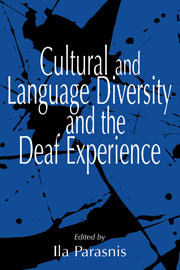Crossref Citations
This Book has been
cited by the following publications. This list is generated based on data provided by Crossref.
Neese Bailes, Cynthia
2002.
Mandy: A Critical Look at the Portrayal of a Deaf Character in Children's Literature.
Multicultural Perspectives,
Vol. 4,
Issue. 4,
p.
3.
Senghas, Richard J.
and
Monaghan, Leila
2002.
Signs of Their Times: Deaf Communities and the Culture of Language.
Annual Review of Anthropology,
Vol. 31,
Issue. 1,
p.
69.
Cohen, Carol B.
2003.
Psychotherapy with Deaf and Hard of Hearing Individuals.
Journal of Social Work in Disability & Rehabilitation,
Vol. 2,
Issue. 2-3,
p.
23.
Skelton, Tracey
and
Valentine, Gill
2003.
‘It feels like being Deaf is normal’: an exploration into the complexities of defining D/deafness and young D/deaf people's identities.
Canadian Geographies / Géographies canadiennes,
Vol. 47,
Issue. 4,
p.
451.
Kelly, Arlene Blumenthal
2003.
What Every Audiologist and Speech-Language Therapist Needs to Know About Deaf Culture.
Perspectives on Communication Disorders and Sciences in Culturally and Linguistically Diverse (CLD) Populations,
Vol. 9,
Issue. 1,
p.
3.
2005.
A Companion to Linguistic Anthropology.
p.
518.
AVON, A.
2006.
Watching Films, Learning Language, Experiencing Culture: An Account of Deaf Culture through History and Popular Films.
The Journal of Popular Culture,
Vol. 39,
Issue. 2,
p.
185.
Berent, Gerald P.
2006.
The Handbook of Bilingualism.
p.
312.
Mpofu, Elias
and
Harley, Debra A.
2006.
Racial and Disability Identity.
Rehabilitation Counseling Bulletin,
Vol. 50,
Issue. 1,
p.
14.
Keating, Elizabeth
and
Hadder, R. Neill
2010.
Sensory Impairment.
Annual Review of Anthropology,
Vol. 39,
Issue. 1,
p.
115.
Sutton-Spence, Rachel
and
Ramsey, Claire
2010.
What we should Teach Deaf Children: Deaf Teachers' Folk Models in Britain, the USA and Mexico.
Deafness & Education International,
Vol. 12,
Issue. 3,
p.
149.
Kushalnagar, Poorna
Mathur, Gaurav
Moreland, Christopher J.
Napoli, Donna Jo
Osterling, Wendy
Padden, Carol
and
Rathmann, Christian
2010.
Infants and Children with Hearing Loss Need Early Language Access.
The Journal of Clinical Ethics,
Vol. 21,
Issue. 2,
p.
140.
Berent, Gerald P.
2012.
The Handbook of Bilingualism and Multilingualism.
p.
351.
Golos, Debbie B.
Moses, Annie M.
and
Wolbers, Kimberly A.
2012.
Culture or Disability? Examining Deaf Characters in Children’s Book Illustrations.
Early Childhood Education Journal,
Vol. 40,
Issue. 4,
p.
239.
Chin, Nancy P.
Cuculick, Jessica
Starr, Matthew
Panko, Tiffany
Widanka, Holly
and
Dozier, Ann
2013.
Deaf Mothers and Breastfeeding.
Journal of Human Lactation,
Vol. 29,
Issue. 4,
p.
564.
Reagan, Timothy
2019.
Language policies, language rights, and sign languages: A critique of disability-based approaches.
Critical Inquiry in Language Studies,
Vol. 16,
Issue. 4,
p.
271.
Labio-Bernal, Aurora
and
García-Prieto, Victoria
2022.
Cultural pluralism and diversity on public television: An analysis of the use of sign language on the BBC and TVE.
Critical Studies in Television: The International Journal of Television Studies,
Vol. 17,
Issue. 2,
p.
135.
Kim, Yeon Soo
Im, Hyeonjeong
Lee, Sunok
Cho, Haena
and
Lee, Sangsu
2023.
“We Speak Visually”: User-Generated Icons for Better Video-Mediated Mixed-Group Communications Between Deaf and Hearing Participants.
p.
1.





